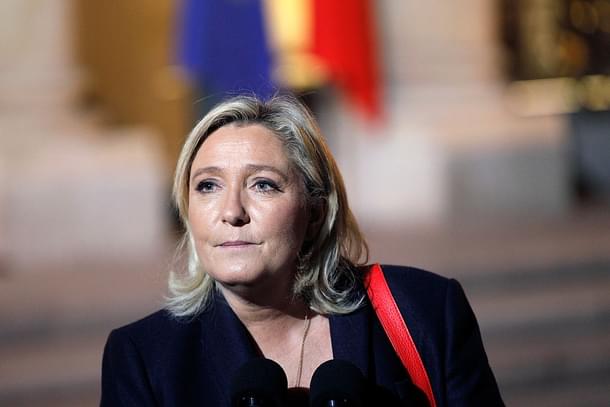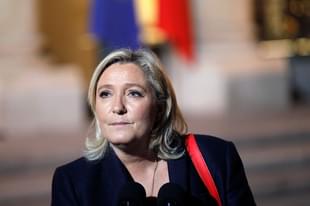World
French Elections: 11 Candidates And An Undecided Electorate
Scott McConnell
Apr 17, 2017, 01:30 PM | Updated 01:30 PM IST
Save & read from anywhere!
Bookmark stories for easy access on any device or the Swarajya app.


My favourite French election headline thus far is from Liberation: “1 Femme, 3 Hommes, 6 Possibilities,” which not only has that faint “wink wink, you know the French” connotation, but also expresses clearly the utter uncertainty of what is going on.
On 23 April, the French will go to the polls to cast their ballot for one of 11 candidates, four of whom are polling at or near 20 per cent. Two weeks later, they will choose between the top two vote-getters. Any of the top four could conceivably make it to the second round, and their chances are altered in ways no one can precisely calculate by which candidate they end up running against.
Fully one-third of the electorate say they are undecided. Do you vote for the candidate you like the most, or the one most likely to defeat the one you fear most? It’s complicated!
France’s political situation is deadly serious, but none of the leading candidates is especially beloved by much of the electorate.
There is Emmanuel Macron, the ‘youngish’ former Rothschild banker and Socialist minister, who has never been elected to anything before, who promises a fresh-faced, middle-of-the-road neo-liberalism and globalism: a France “open to all” is his slogan.
Astonishingly, given that the number of Frenchmen who want a France open to all is no majority, he remains the odds-on favourite to win the presidency.
His main competitors are Francois Fillon, the candidate of the established centre-right party, who was the favourite three months ago until he was put under official investigation for putting his wife on the state payroll for various well-paying no-show jobs.
It’s possible to argue the Fillon is a victim of changing standards, and that 20 years ago no one would have cared about such things. Possible also that Fillon crossed some unclear line about blatantly stealing from the state, where a more modest salary for his English-born Penelope and an occasional office appearance by her would have been perceived as unremarkable.
Fillon looks tired – he has large bags under his eyes (one French woman told me he ought to have that fixed). But that aside, he probably is what a great deal of what both middle-class and establishment France wants – a harder line on immigration, a hard line on “totalitarian Islamism,” greater fiscal discipline, a tempered deregulation of the economy. He did after all win the primary of “Les Republicans” (the renamed centre-right party) against more centrist figures.
Then there is the National Front’s Marine Le Pen, whose singular and perhaps historic accomplishment is to take her father’s rather fringy right-wing party and bring it into mainstream of French politics. Le Pen is a tenacious worker, disciplined and ambitious. She actually had to purge her aging father from her party because his remarks to the press undermined her efforts to rid it of its somewhat “fashy” reputation.
“Dediabolisation,” or de-diabolise, has been her watchword over the past five years, and she has more or less succeeded. She is the candidate for Brexit and Trumpism and far stricter immigration controls, and is pro-worker-rights in ways that have allowed to recoup some former communist voters. (Thirty or 40 years ago, the French Communist Party was a steady 20 per cent force in French politics.) She expresses strongly the desire for the greater immigration control many French yearn for – a few years ago she described the staid images of Muslims holding prayer services in the street felt “like an occupation”.
But Madame Le Pen is a decent campaigner, not a great one. Her speeches lack a certain flair and spontaneity; she hasn’t rolled over her opponents in the free-for-all debates. She has emphasised (perhaps to not seem to be obsessed with immigration) French withdrawal from the EU and the Euro, which might be plausible, but frightens many middle-class people. (Curiously no one seems really scared anymore by her anti-Islam suggestions; they seem kind of normal.)
In any case, Marine Le Pen polls well in the first round, but poorly when it comes time to add to her existing 24 per cent against any of her potential opponents. This year, at least, her role might be to put her party on the political map as a major contender for power and lay the groundwork for a powerful parliamentary presence (which the National Front now lacks). But then again, who knows, and she is certainly far more prepared – in terms of understanding politics and issues – than the current American president.
Finally, there is Jean-Luc Melenchon, French flavour of the week. To be clear, he is to the left of Bernie Sanders (the latter of whom, in his campaign, refrained from praising Castro and Hugo Chavez and never proposed a 100 per cent tax on high salaries).
Mélenchon, 66 years old and a former socialist from the party’s left wing, occupies the political space that the French Communist Party once did – and as I mentioned, it is a considerable space in France. But he doesn’t have the burden of the Soviet Union on his shoulders and is an attractive campaigner, acknowledged by all to be the best orator in the race.
In the last weeks, he has benefited from outperforming the Socialist candidate Benoit Hamon in debates and on the stump, and has suddenly seen his polls rise from 10 or 12 per cent to nearly 20. He could make it to the second round. He could win.
There are seven others on the ballot, a mixture for the most part of of fiery leftists and former Gaullists – all of whom were able to gather 500 signatures from elected officials to qualify.
In a tight race, whether the entertainingly insouciant leftist auto worker Phillipe Poutou receives 1 per cent of the vote or 2.5 per cent has an enormous bearing on which two candidates will make it to the second round.
If you like politics as theatre, it’s hard to beat.
This piece was first published in The American Conservative and has been republished here with permission.





